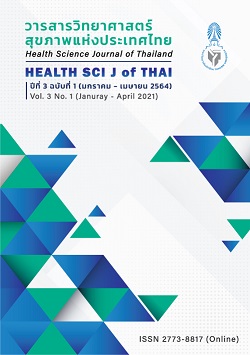Effect of Holistic Care Model on Self care Behavior of People Living with HIV/AIDS
Main Article Content
Abstract
This quasi-experimental study aimed to determine the effect of holistic care model on selfcare behavior of people living with HIV/AIDS. The sample consisted of 60 people living with HIV/AIDS, recruited through simple random and sampling according to specific inclusion criteria: the amount of HIV in the bloodstream > 50 copies/ml. These were assigned into two groups, experimental and control groups, with 30 per group. The experimental group received the holistic care model on self-care behavior for 12 weeks, and the control group received the usual care. The research instruments comprised: 1) experiment instruments including the holistic care model on self-care behavior, and 2) the self-care behavior questionnaire of people with HIV / AIDS. Results revealed that the mean scores of self-care behavior in the experiment group after receiving holistic care model at posttest was significantly higher than at pretest (Mean difference = -14.37, 95% CI: -16.69, - 12.05). The mean score of self-care behavior at posttest of the experimental group was significantly higher than that of the control group (Mean difference = -8.53, 95% CI: -11.47, - 5.60).
Article Details
References
Bureau of Epidemiology, Department of Disease Control, Ministry of Public Health. Situation of AIDS Patient in Thailand. [Internet]. 2019 [Accessed 31 October 2019] Available from http://www.boe. m o p h . g o . t h / fi l e s / r e p o r t . /20141128_61345755.pdf.
Uthis, P., Khunbutri, N. Guideline to Self-Care for People Living with HIV enhance value, reduce self-stigma. Bangkok: Faculty of Nursing, Chulalongkorn University; 2017. (In Thai)
Ongwandee, S., Boddy. Thailand. National guidelines on HIV/AIDS treatment and prevention 2014. Bangkok: Bureau of AIDS, TB and STIs, Department of Disease Control, Ministry of Public Health, Thailand; 2014.
C h o t i s e n , O . , P r a d i t b a t u k a , S . , Cheevakasam-sook, A. Factors Related to People living with HIV/AIDS Behaviors at Sirindhorn Hospital, Medical Service Department, Bangkok Metropolitan Administration. Journal of The Royal Thai Army Nurses 2015; 16(1): 41-50. (In Thai)
Kongblod, S., Janepanish, P., Panpukdee, O. Perceived Self-Care Demands and Self-Care Behavior of AIDS Patients with Opportunistic Infections. Rama Nurse Journal 2515; 21(1): 38-50. (In Thai)
Chaiyasit, Y. Application of Functional health patterns for Holistic nursing with Evidence-based practices. Journal of Nurses, Association of Thailand North-Eastern Division 2013; 31(2): 100-110. (In Thai)
Balthip, Q., Petchruschatachart, U., Piriyakoon-torn, S., Boddy, J. Achieving Peace and Harmony in Life: Thai Buddhists Living with HIV/AIDS. International Journal of Nursing Practice 2013; 19(2): 7-14.
Balthip, Q., Purnell, M. Pursuing meaning and purpose in life among Thai adolescents living with HIV: A grounded theory study. Journal of the Association of Nurses in AIDS Care 2014; 25(4): 27-38.
Kaewdang, K., Rachaniyom, S. Nurses and Holistic Nursing Care in AIDS Patient. Journal of Phrapokklao Nursing College 2015; 26(1): 128-135. (In Thai)
Balthip, Q., Chandrema, S. Process of Establishing Purpose of Life of Thai Teenagers living with HIV. Songklanagarind Journal of Nursing 2013; 33(3): 1-15. (In Thai)
Polit, D.F., Beck, C.T. Nursing research: Generating and assessing evidence for nursing practice. (8th ed.). Philadelphia: Lippincott; 2008.
Bureau of AIDS, Department of Disease Control, Ministry of Public Health. HIV/AIDS Treatment Literacy: The agricultural co-operative federation of Thailand Publishing Limited; 2012. (In Thai).
National Health Security Office, Thailand. National guidelines on HIV/AIDS treatment and prevention 2017. Bangkok: Sahamitr printing and publishing company limited; 2017. (In Thai)
Somkumlung, P., Suwannakom, D. Nursing practice for spiritual well-being dimension in Terminal ill patients. Journal of Nursing Science & Health 2009; 32(2): 98-110.
Phongprapapan, P., Sanveingchan, S., Panya, P. Models to promote integral health care in diabetic patients at Wat Puranawas Community. Nursing Journal of the Ministry of Public Health 2013; 22(3): 100-111. (In Thai)
Samitakestrin, S. A study of the mental health of people with HIV who attended the Infectious People Club. Bangkok: Bureau of AIDS, TB and STIs, Department of Disease Control, Ministry of Public Health, Thailand; 2009.
Boonyaleepun, S., Boddy. Health Behaviors of Working – Age Patients with HIV/AIDS Receiving Antiretroviral Therapy in a Tertiary Care Hospital. Nursing Journal.2013; 40(1): 1-13. (In Thai)
Veerakul, K. Factors Affecting the Cooperation of Treatment Behavior among HIV Infected/ AIDS Patients Attending Antiretroviral Therapy Program at Thung Tako Hospital, Chumphon Province. The 2nd STOU Graduate Research Conference; 2554.
Aksirivaranon, S. The development of care models to meet the needs of people living with HIV / AIDS patients in Dan Makham Tia hospital, Kanchanaburi. Thai AIDS Journal. 2010; 22(2): 85-92. (In Thai)
Pender, N.J., Murdaugh, C.L., Parson, M.A. Health Promotion in Nursing Practice. 5th ed. New Jersey: Pearson Education; 2006.
Hanmon, R., Kasatpiba, N., Chitreechuer, J. Effects of Self-management Enhancement on Antiretroviral Drug Adherence and Risk Behaviors among People Living with HIV/ AIDS. Nursing Journal. 2013; 40(3): 40-49. (In Thai)
Midkhuntod, J. Treatment Literacy of HIV/AIDS Patients: A Case Study of Takhli Hospital, Nakhonsawan. Thai AIDS Journal. 2019; 31(2): 85-99. (In Thai)


